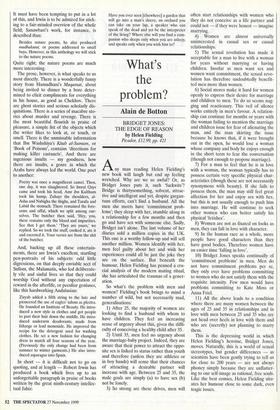What's the
problem?
Main de Botton
BRIDGET JONES: THE EDGE OF REASON by Helen Fielding Picador, £12.99, pp. 421
Any man reading Helen Fielding's new book will laugh but end up feeling wretched. Why are we so awful? Or, as Bridget Jones puts it, such lucicwits'? Bridge is thirtysomething, solvent, attrac- tive and intelligent and yet, despite gargan- tuan efforts, can't find a husband. All the men she meets have 'commitment prob- lems'; they sleep with her, stumble along in a relationship for a few months and then go and have sex with someone else. Sadly, Bridget isn't alone. The last volume of her diaries sold a million copies in the UK. This one is a worthy follow-up and will sell another million. Women identify with her, men feel guilty about her and wish her experiences could all be just the joke they are on the surface. But beneath the humour, Helen Fielding has penned a cru- cial analysis of the modern mating ritual, she has articulated the traumas of a gener- ation.
So what's the problem with men and women? Fielding's book brings to mind a number of wild, but not necessarily mad, generalisations: 1) After 25, the majority of women are looking to find a husband with whom to have children. They feel an increasing sense of urgency about this, given the diffi- culty of conceiving a healthy child after 35.
2) Until 35, men feel no urgency about the marriage-baby project. Indeed, they are aware that their power to attract the oppo- site sex is linked to status rather than youth and therefore (unless they are athletes or in boy bands) will sense that their chances of attracting a desirable partner will increase with age. Between 25 and 35, the male goals are simply (a) to have sex (b) not be lonely.
3) So strong are these drives, men will often start relationships with women who they do not conceive as a life partner and could not — if they were honest — imagine marrying.
4) Women are almost universally uninterested in casual sex or casual relationships.
5) The sexual revolution has made it acceptable for a man to live with a woman for years without marrying or having children. Insofar as men want sex and women want commitment, the sexual revo- lution has therefore undoubtedly benefit- ted men more than women.
6) Social mores make it hard for women openly to express their desire for marriage and children to men. To do so seems nag- ging and reactionary. This veil of silence works entirely in men's favour. A relation- ship can continue for months or years with the woman failing to mention the marriage and children issue for fear of alienating the man, and the man skirting the issue because he knows that, if it were brought out in the open, he would lose a woman whose company and body he enjoys enough in the short term to fear the conversation (though not enough to propose marriage).
7) For a man to feel that he is in love with a woman, the woman typically has to possess certain very specific physical char- acteristics (though these are not necessarily synonymous with beauty). If she fails to possess them, the man may still feel great affection for her and enjoy sex with her, but this is not usually enough to push him into marriage. He will continue to seek other women who can better satisfy his physical 'fetishes'.
8) Women are not as fixated on looks as men, they can fall in love with character.
9) In the human race as a whole, more people have good characters than they have good bodies. Therefore women have an easier time 'falling in love'.
10) Bridget Jones speaks continually of 'commitment problems' in men. Men do not have commitment problems per se, they only ever have problems committing to women who do not satisfy them with the requisite intensity. Few men would have problems committing to Kate Moss or Anna Friel.
11) All the above leads to a condition where there are many women between the ages of 25 and 35 in relationships and in love with men between 25 and 35 who are not head over heels in love with them and who are (secretly) not planning to marry them.
This is the depressing world in which Helen Fielding's heroine, Bridget Jones, moves. Naturally, this is a world of sexual stereotypes, but gender differences — as scientists have been gently trying to tell us for close to 200 years — are not always phoney simply because they are unflatter- ing to our self-image as rational, free souls. Like the best comics, Helen Fielding situ- ates her humour close to some dark, even tragic issues.


























































































 Previous page
Previous page